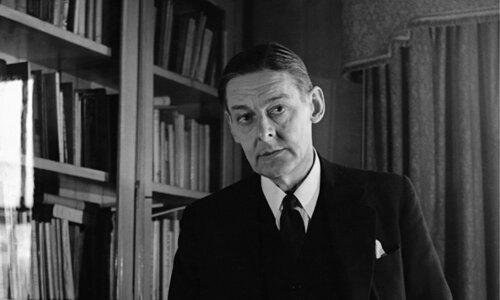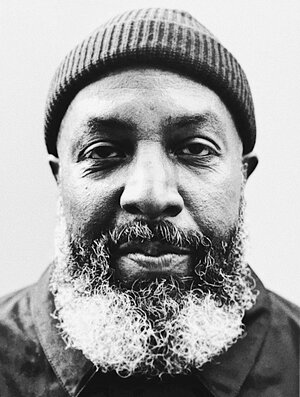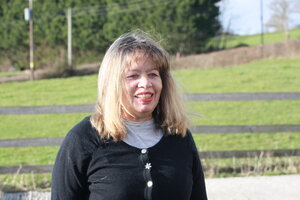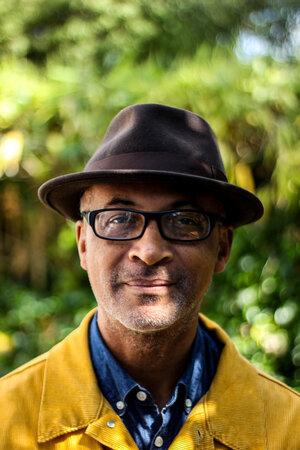One of the twentieth century’s most important literary figures, T S Eliot continues to inspire writers from all over the world today. This 2009 BBC Arena documentary takes an in-depth look at the Nobel Prize winner, a man who was a poet, playwright, children’s writer, critic and publisher — but who was also a husband, a friend, and an American settler in the UK. As well as looking at his work, for the first time Eliot’s widow Valerie, with whom he spent the final years of his life, opens her personal archive, including the private scrapbooks and albums in which he documented their life together. Small Wonder Short Story Festival, Charleston, screened Arena’s T S Eliot, alongside a thought-provoking film of contemporary responses from celebrated authors Kate Mosse, Roger Robinson and Imogen Lycett Green. Here, you can still enjoy exclusive new poems inspired by the film from British-Guyanese poet Maggie Harris and British-Sri Lankan writer Minoli Salgado, and learn how to start your own personal writing journey with help from seasoned author Colin Grant’s masterclass.
ARENA: T S ELIOT
Producer/Director: Tim May; Film Editor: Guy Crossman; Photography: Chris Seager; series director Anthony Wall

Let us go then, you and I
When the evening is spread out against the sky
Like a patient etherised upon a table…
The opening lines of The Love Song of J. Alfred Prufrock by T. S. Eliot; this was my introduction, along with many others, to modern poetry, at school at the age of fifteen or sixteen. In 1915, when it was published, it was the world’s introduction to modern poetry. Once read, these lines can surely never be forgotten.
Eliot broke the mould and has been a determining influence ever since, not least on Arena itself. Eliot pioneered the juxtaposition of the aesthetic and the intellectual with the commonplace and the ordinary. He took poetry somewhere that had never been imagined.
Eliot’s work has been fiercely protected by his estate. The simplest request to quote a few lines would be met with the sternest scrutiny. So when they approached us, we were taken aback, to say the least, and of course thrilled and glad that they thought we would be the right people to make a film about him and his work.
The solid centre of any arts series is the portrait of the artist. The artists portrayed on Arena are nearly all from the era of film. Prufrock was published at the same time that film ceased to be a fairground attraction and became a new kind of art — and the world’s dominant entertainment. When it comes to making an art documentary, the profile is often the most conventional and predictable form — a good story of the life and work of a fascinating and significant person. Eliot offered more. His ambivalence, contrasts and contradictions enabled director Adam Low and film editor Joanna Crickmay to flash back and forwards to deepen the film and reveal the underlying shape of Eliot’s life.
He was from the American frontier – St Louis Missouri – yet affected the manners and reserve of an English gentleman. Among the most famous figures of his day, for years he didn’t even own his own home. The most intellectually achieved of writers, his greatest public success has been a stage musical based on his humorous verse about cats. Cats ran for twenty years in the West End and eighteen on Broadway. The ultimate poetry revolutionary, he was happy to be first a successful banker and then a senior editor at Faber & Faber publishers, occupying the same tiny office for decades.
In a vintage piece of archive, W. H. Auden observes that young poets want to emulate their heroes; he says his generation were spared that emotion, having no aspiration to Eliot’s rolled umbrella and bowler. Realising the pressure in such opposing forces can generate more tension in a film than straight narrative alone might.
Arena has never had a manifesto or a set agenda. I remember when Alan Yentob was the Series Editor in the early 1980s, a director asked him for advice on how to approach the film he was making. Alan said, ‘Just make it really interesting.’
Aiming at neat and tidy conclusions that purport to be definitive is not going to explain a life and work as complex as Eliot’s, analysis that in truth is speculation in disguise. This film aimed to be an evocation of the artist’s world and an invitation to the viewer to enter into it.
Perhaps the biggest irony of all is that T. S. Eliot, one of the greatest essayists and critics of all time, a fearless commentator on the work of others, was signally disinclined to explain his own poetry. A hundred years after his work was published, I hope the film shows that his writing continues to enchant, fascinate and disturb and, above all, to maintain its unique mystery.
Anthony Wall
24 August 2020
YOUR LOCAL ARENA: RESPONDING TO T S Eliot
Watch acclaimed author Kate Mosse, poet Roger Robinson who recently won the T S Eliot Prize for Poetry and award-winning writer Imogen Lycett-Green’s take on the Arena film.
Responding to the film
INSPIRED BY ARENA’S T S Eliot:
Listen to and read specially commissioned poems from two acclaimed poets from the region, inspired by the T S Eliot film.
Maggie Harris
‘There by the Waters of Margate I sat down and Wept’
Commissioned Poets
WRITING YOUR MEMOIR: A Masterclass from Colin Grant
Taking Arena’s T S Eliot film as a starting point, explore how you can begin to craft your own memoir or life writing with expert non-fiction author Colin Grant, who is based in Brighton.
Interviews
An Interview with Anthony Wall
An Interview with Susannah Stevenson

+Ruth+Crafer+high+res.jpg)





